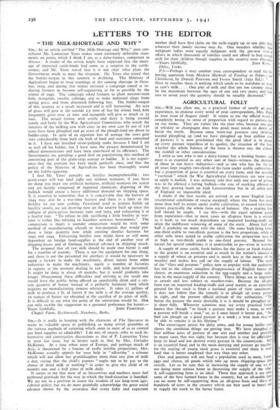Stn,—Is it really in keeping with the character of The
Spectator to waste its valuable space in publishing so many trivial grumbles at the various methods of rationing which seem to most of us to control our food supplies so admirably? I do not, of course, refer to such in- formative and constructive discussions as that of P. Lamartine Yates in your last issue, but to letters such as that by Mrs. Gwladys McKenna. At a time when most of Europe, and perhaps much of Asia, is threatened by a famine of really terrible proportions, Mrs. McKenna actually appeals for your help in " adjusting " a scheme which will not allow her granddaughter more than one pint of milk a day, saying that the child's parents " ought not to be put to the choice of dried milk or nothing " in order to give this child of 18 months one and a half pints of milk daily.
It seems to me that most of us housewives and mothers must feel profound gratitude for the way in which the food-situation is handled. We are not in a position to assess the wisdom of our long-term agri- cultural policy, but we do most gratefully acknowledge the great social advance shown by the assurance that every baby and expectant
mother shall have first claim on the milk-supply up to one pint daik whatever their family income may be. One wonders whether Ibex indignant ladies were equally indignant with the pre-war state d affairs in which thousands of families could not afford to buy enough milk for their children though supplies in the country were abundani —Yours faithfully, JOAN KING, Ilkley, Yorks.
P.S.—Perhaps it may comfort your correspondent to read the fol• lowing quotation from Modern Methods of Feeding in Infancy ati Childhood, by Donald Paterson and Forest Smith (1931 Ed.): ". Next to starches there is nothing which tends to be overdone so much as cow's milk. . . . One pint of milk and that not too creamy should be the maximum between the ages of one and two /ears, and from two to seven years the quantity should be steadily decreased."


























 Previous page
Previous page